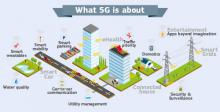Key 5G players from the EU, China, South Korea, Japan and the US have met at the ICT 2015 event in Lisbon. On the agenda: how different regions can work together to accelerate the definition of 5G standards and to better co-operate on spectrum allocation for 5G.
Key global 5G players have discussed future standards and spectrum for 5G. The meeting, held during the ICT-2015 conference, gathered the main 5G regional initiatives (industrial associations representing the EU, the US, South Korea, China, and Japan), as well as representatives of governments and regulatory bodies. Following a series of landmark agreements between the EU and international partners in 5G research, Günther H. Oettinger, European Commissioner for the Digital Economy and Society, has brought the 5G community together to explore how different regions can work together to accelerate the definition of 5G standards and to better co-operate on spectrum allocation for 5G.
The workshop came only a few weeks after the start of discussion in the the 3GPP (a key international standards body) on the timeframe and scope for 5G standards. The race is on to agree a global vision for 5G and to identify the services (for example Internet of Things, connected cars, very high-definition video streaming, or health related services) which should be the first delivered by 5G and by when this should happen.
The issue of spectrum allocation is also being discussed in the light of crucial negotiations at the upcoming World Radio Conference 2015, that should culminate during the World Radio Conference 2019. The respective industrial associations have also seized the opportunity to sign a Memorandum of Understanding to hold a twice-yearly "Global 5G Event". The first event will take place in Asia in the first half of 2016 under the responsibility of IMT-2020 (5G) Promotion Group; and the second in the second half of 2016 in Europe, under the responsibility of the 5G Infrastructure Association.This will be the place to move forward on strategic discussions.
In a speech opening the session, Commissioner Oettinger reminded participants of the need for speed suggesting "We need to shift a gear up in our international cooperation on standardization, global spectrum identification and allocation. These key topics cannot be dissociated from the technological work in a strategic industrial topic like 5G on these two key aspects".
Full details of the workshop proceedings will be published on the 5G PPP website
Standards
Panels addressed 5G standardisation priorities, milestones and approach from the perspective of governments and related industrial associations and fora.
On standards, Commissioner Oettinger stressed the Commission's view that one single global standard should be the objective for key radio and network components of 5G. "5G will be a great opportunity for sectors like automotive, health, or factories other vertical industries. This requires that these industries are also associated in the standardisation process, which may require some time. The 5G standardisation process will be more complex than that of 4G, with the need to work with IT standardisation bodies, beyond those classically addressed by the telecom industry. Our common objective should be for 5G commercial products from 2020 onwards in support of a vibrant global 5G enabled ecosystem. "
Spectrum for 5G
On 5G spectrum, representatives discussed the possible scenarios to ensure worldwide interoperability from the start, by deploying fully harmonised frequencies simultaneously in all regions, as well as the potential of the so-called millimetre waves to dramatically increase capacity as compared to 4G.
Background
Since 2013, major national and regional initiatives have been launched to support industrial 5G developments. In December 2013, the European Commission launched a Public-Private Partnership on 5G (press release - Factsheet). The EU is investing €700 million by 2020 in this partnership through the Horizon 2020 research and innovation programme. EU industry is set to match this investment by up to 5 times, to more than €3 billion euros.
Asia is home to important initiatives such as the IMT 2020 (5G) Promotion group of China, the 5G Forum of the Republic of Korea, and the 5G Mobile Communications Promotion Forum of Japan. In the USA, 4GAmericas plays an important role for industrial coordination. The European Commission signed has 5G partnership agreements with China, South Korea and Japan in recent months with the EU and US industrial associations also working closely together.
At the 2015 Mobile World Congress (MWC), the European Commission and Europe's tech industry presented the EU's vision of 5G technologies and infrastructure. This ambitious strategy gives the EU a strong voice in the next phase of 5G discussions at the global level that should lead to international agreements, including on standards. (see also the speech of Commissioner Oettinger at the event).
Through its Digital Single Market Strategy, the Commission is committed to improving spectrum coordination in the EU, particularly in view of future 5G needs. The Commission has just launched a review of the EU's telecoms framework and present legislative proposals for an ambitious overhaul of EU telecoms rules in 2016. This includes more effective spectrum coordination, and common EU-wide criteria for spectrum assignment at national level.
More information
Webpage on the Digital Single Market (#DigitalSingleMarket)
Webpage of Commissioner for Digital Economy and Society Günther H. Oettinger (@GOettingerEU)










